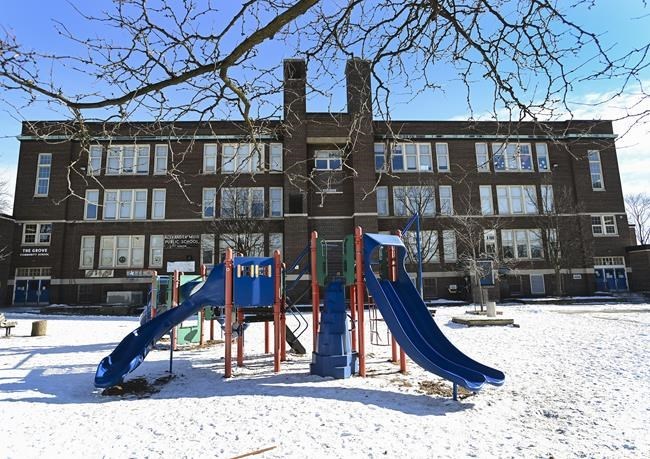
An empty playground in a schoolyard is shown in Toronto on February 3, 2021. THE CANADIAN PRESS/Nathan Denette
Republished January 25, 2024 - 2:00 PM
Original Publication Date January 25, 2024 - 8:01 AM
The Canadian Paediatric Society says a little risk can be good for kids' physical and mental well-being.
The national organization issued new recommendations Thursday that encourage kids to engage in unstructured outdoor play — and "risky play" in particular.
It said that type of play varies by child, but is generally defined as "thrilling and exciting free play that involves uncertain outcomes and the possibility of physical injury."
Examples include play at height or speed, supervised activities involving tools such as hammers, ropes and knives — such as whittling or building — and the chance of getting lost.
While it can be scary for parents to allow risk into their kids' lives, the pediatric group said this sort of play is crucial for children's mental, social and physical development.
But the organization said that doesn't mean ignoring safety regulations. Kids shouldn't be left unsupervised in hazardous areas, nor should they be pushed outside their comfort levels.
It's up to the grown-ups to be aware of hazards, and intervene if the potential harm is more serious than the child is able to recognize and manage.
Dr. Emilie Beaulieu, who authored the society's guidance document, said risky play has been studied for at least 20 years as having multiple benefits including increased physical activity.
"Children are more active, there are lower rates of obesity and there are all these other indicators around cardiovascular health," she said in an interview from Quebec City, where she is a pediatrician.
"We also see that they are less stressed and have better relationships with their peers," said Beaulieu, adding research also suggests kids have fewer conflicts and higher self-esteem when they're allowed more riskier play during recess.
"I think where we are now is trying to find the right balance between letting kids play freely and incorporating risk in their play while making sure that they're still safe and avoiding hazards."
Monkey bars have resulted in plenty of injuries, and trampolines may be dangerous if children do not land on their feet so parents should consider potential hazards, Beaulieu said.
But telling kids to "go play outside" would help reduce screen time as they benefit from being out in nature, said Beaulieu, who has two young children.
"We deal with risky play every day," she said. "I learned from society and my parents. My first thought is, "Be careful!"
Instead, it's best for parents to manage any risks by guiding children and asking them questions, including whether a structure is safe enough to support their weight, she said.
This report by The Canadian Press was first published Jan. 25, 2024.
Canadian Press health coverage receives support through a partnership with the Canadian Medical Association. CP is solely responsible for this content.
News from © The Canadian Press, 2024